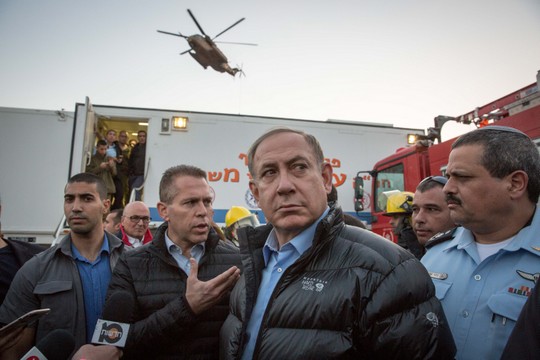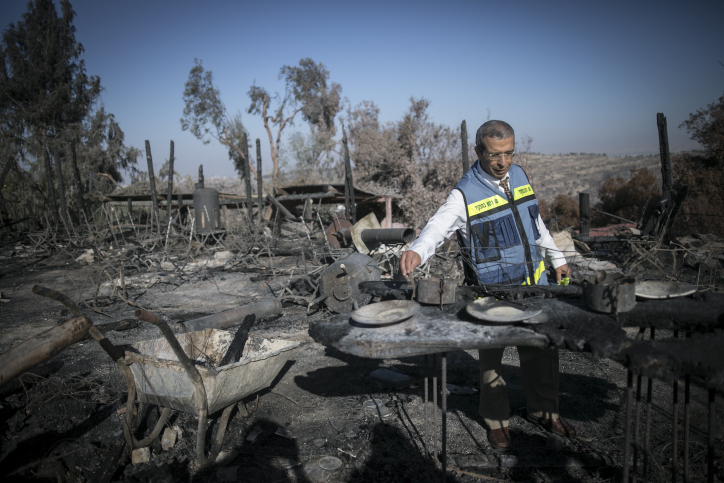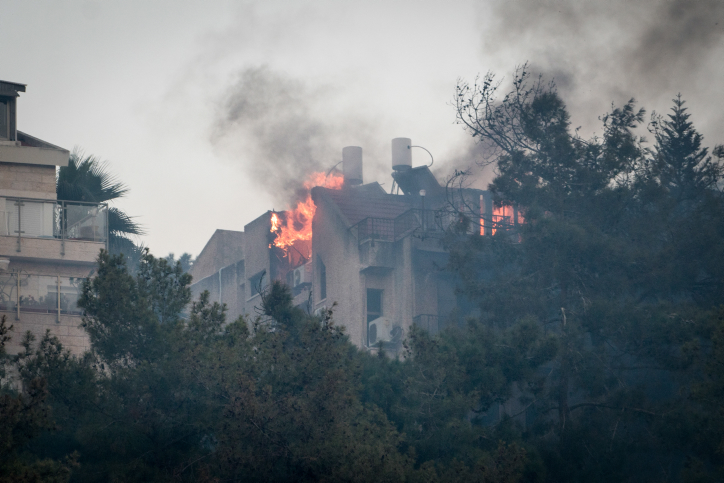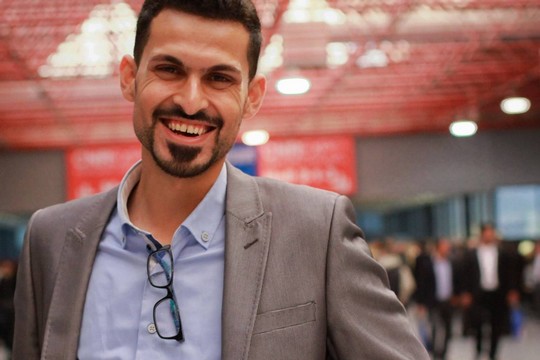The police has yet to declare a single wildfire an act of terrorism, the commissioner says arson is a self-fulfilling prophecy, and many cases of suspected terrorism turned out to be nothing more than negligence. This, of course, does not bother Israel’s leaders or media.

Now that the rain has started pouring, bringing an end to the wildfire season, it is imperative that we stop and look back at just what happened last week — before everything is forgotten. Or worse: before everything that happened is remembered as a story of terrorist attacks by Arab citizens against Jews.
Only a week ago did Israel’s biggest media outlets publish headlines such as “The arson intifada” (Ynet), “A wave of arsons” (Yedioth Ahronoth), and “Dozens of fire attacks” (Makor Rishon). Ministers competed over who could most harshly condemn the supposed arsonists and with proposed laws, including the usual calls for demolishing homes and revoking citizenship. Social media was full of calls for revenge, which were then given full backing by MK Oren Hazan (Likud), when he stood before the Knesset Wednesday, lit a lighter and said [Hebrew]: “It is time that we give them what they deserve… an eye for an eye is not something far from reality.”
Last Friday the police made a relatively unusual political announcement, calling on the Arab leadership to work and put an end to the arsons. This, after Joint List MKs and mayors of Arab towns and cities made clear that there is no place for sweeping accusations against Arabs until the fires were proven to be the result of arson. Arab leaders, suffice it to say, issued condemnations ahead of time. Even the Palestinian Authority sent eight fire trucks to help put out the flames.
Just a few days ago opposition leader Isaac Herzog began attacking the government [Hebrew] for being ill-prepared to deal with arson attacks. This is how a story becomes the truth.
‘We told them how simple it was’
But what do we actually know about this wave of wildfires? We know that there were 1773 different fires according to the Israel Fire and Rescue Services. The police were called to 90 of these “events,” 40 of which were investigated for a number of crimes (including negligence, as well as arson and attempted arson). The Israel Tax Authority announced that nine of the fires will be counted as nationalistically-motived arsons, yet the police and the Fire and Rescue Services were quick to respond that Authority’s list was not based on facts, and that there is no way to prove that any of those nine fires were the result of arson.

On Friday the Israel Fire and Rescue Services released a statement according to which 40 of the fires were the result of arson. The majority of these took place beyond the Green Line. Inside Israel, five of the arson cases took place inside Nazareth (several residents have already been arrested), which is a reminder that arson does not always mean terrorism.
Sources in the police told +972 that as of Thursday morning there were 17 people under arrest, from both Israel and the occupied territories, who are being interrogated for suspected arson. Only one indictment was served against a resident of Umm al-Fahm, who set fire to a pile of garbage in protest of the local authorities. Among the detainees are residents of Nazareth, Deir Hanna, and Sajjur, all of whom are suspected of lighting fires near their own villages. The police refuses to provide more precise details or a final suspect count — since they still don’t have all the answers.
Last Sunday Police Chief Roni Alsheikh made the following remarks (which did not get the proper media attention):
There is no doubt that from a certain point when the issue made headlines, it became a ‘wave’ because everyone saw how easy it is, and we also explained to everyone how simple it is — we need to take that into account. I assume that the first events were more the result of negligence, and the later events it all turned into arson. But we are investigating everything properly.
Alsheikh’s statements are astounding. The man who is in charge of fighting arsons says that, to his understanding, one of the main drivers of the arsons were the very discussions about arson. That is, there were fewer arsons before they became the central aspect of the discussion. In other words: a self-fulfilling prophecy.
We can safely say that the first fires that erupted were not the result of arson. Last Sunday the commissioner of Israel’s Fire and Rescue Services issued an order forbidding the lighting of bonfires in open areas due to extreme weather conditions, which “increase the likelihood of fires.”
Over the next few days fires broke out, many of which were the result of suspected arson. It turned out that the story was something else entirely. In Beit Meir two thieves were caught after they were suspected of committing arson, although the fire that erupted was the result of flares that were set off as the thieves were being chased. The man who apparently committed arson in the West Bank village of Battir did so on his own land, near his home, at a distance from any nearby Jewish town (he was released from custody on Thursday morning, following several days of being denied a meeting with an attorney, as well as Shin Bet interrogations). His attorney, Gaby Lasky, told +972 that the fire was set on purpose as a way to take care of his land, and that even the state was convinced of this and let him go.
The case of Haifa
Cases of suspected arson, which mostly took place beyond the Green Line, happened only after our leaders told us we were under attack, and after several Arabic-language Facebook pages began celebrating the fires. Just as Roni Alsheikh said.
Of course there is a huge difference in the political significance between Palestinians from the West Bank — who have lived under and fought against military rule for 50 years — and arson by Palestinian citizens of Israel. Arson, of course, is never acceptable — and yet, there is a difference between the two.

What about Haifa? Haifa, it seems, was the fire that convinced the Israeli public that we were dealing with terrorism. Reporters described a number of fires inside the city that erupted concurrently, one of them next to a fire station — which was described as an attempt to distract the firefighters and maximize damage. Commentator Ron Ben Yishai was quick to determine [Hebrew] that “even those who are not experts can determine that in many cases, if not most, are the result of arson.” The fact that nearly all the neighborhoods affected by the fire are Jewish, or that a number of suspects were arrested within hours (they were later released), didn’t help.
A week has gone by and the picture looks quite different. Haaretz reporter Nir Hasson published as number of posts on his Facebook page (which helped immensely in writing this piece), among them commentary by the investigators [Hebrew] who explained how it is possible that the fires actually spread from a single, initial fire. In a different post Hasson writes that, “even the Fire and Rescue Services are convinced that the fire began in a single location, which then spread and caused the major fires — and another fire that started near the fire station.” A week later, not a single person has been arrested in relation to the Haifa fire.
What else do we know? A long list of environmental experts explain how beyond global climate change — which have caused many large fires over the last years, and which caused thousands of fires across the Middle East over the past two weeks — the way Israel uses its open areas creates the conditions for dangerous wildfires. Intensive forestation, the lack of efforts to clear brush and creating buffer zones between forests and inhabited areas, the lack of grazing, etc. — all of these only intensify wildfires.
Responsible leadership
While we do not know of a single case in which an Israeli citizen committed arson with nationalistic or racist motivations, we do know about a massive effort by Arab citizens in putting out the fires, in supporting the firefighters, and in taking in evacuees. We know that even the Islamic Movement opened an emergency center for all people, regardless of faith or nationality. We know about fires inside or next to Palestinian villages and towns on both sides of the Green Line (some of them, it turns out, were likely the result of arson, but not of the nationalistically-motivated kind). We know that one of the few people arrested for incitement to commit arson, Anas Abudaabes, wrote a satirical Facebook post criticizing those who celebrated the fires.

We know that members of Knesset from the Joint List, who represent the Arab public, were committed to putting out the fires and in helping to ease the tensions between Jews and Arabs — to put out the fires that Netanyahu and his ministers tried to ignite. Imagine if instead of escalating and inciting, our prime minister would emphasize all the positive aspects living alongside one another.
But what we got from our politicians and the media — the story most Israeli citizens believe — was a completely different one from what happened. It is possible that we will discover that the fires were the result of horrific arson attacks, in which case we will need to bring the perpetrators to justice. But as of right now, the biggest danger facing us are the fires being lit by our leaders and the media.
This article was first published in Hebrew on Local Call. Read it here.

